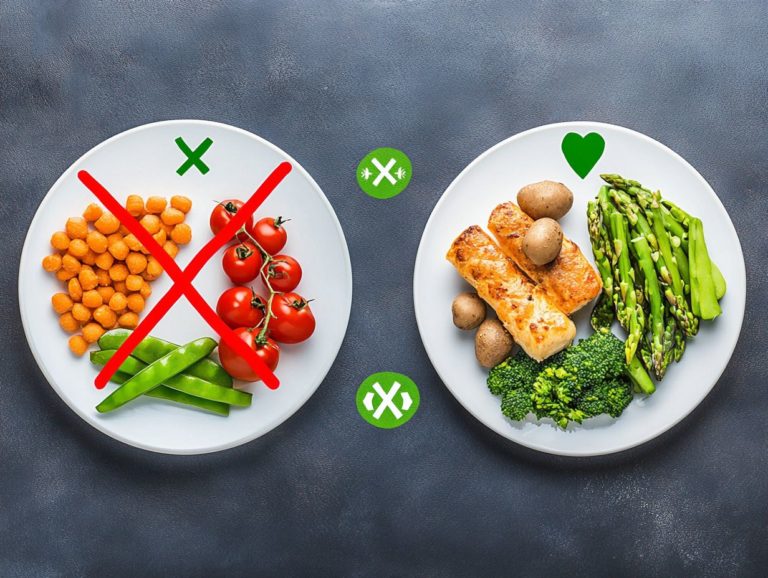Are High-Carb Diets Bad for You?
Carbohydrates ignite strong debates in nutrition, ranging from strong support to serious concerns.
Let s dive into the fascinating world of carbohydrates! We’ll explore their various types and the ongoing discussion around high-carb diets.
We ll look at potential health risks, highlight the benefits of a balanced intake, and share practical tips for managing your carb consumption.
Whether you’re a carb enthusiast or a cautious consumer, knowing about this essential nutrient empowers you to make informed dietary choices.
Contents
Key Takeaways:

High-carb diets aren’t inherently bad, but the type of carbs matters. Refined carbs can lead to weight gain and chronic diseases.
In contrast, complex carbs provide essential nutrients and have a lower impact on blood sugar levels.
The debate on high-carb diets continues, with arguments for and against. Some advocate for low-carb diets for better weight management, while others stress the importance of a balanced carb intake.
Balance and sustainability are key. Instead of eliminating carbs, focus on incorporating complex carbs in moderation to find a sustainable balance that suits your lifestyle.
Understanding Carbohydrates
Knowing about carbohydrates is crucial for making informed dietary choices. They are a primary energy source for your body and vital for your health.
Carbohydrates fall into two categories: sugars, starches, and fiber-rich foods. Each type affects your body and health differently.
It s important to follow dietary guidelines from reputable organizations like the National Institutes of Health. This knowledge can help reduce the risk of chronic diseases.
Types of Carbohydrates
Carbohydrates can be simple or complex, each providing unique health benefits that impact weight management and overall health.
Simple carbs are quick energy sources found in fruits, milk, and sweeteners like honey. Complex carbs, such as whole grains and vegetables, provide sustained energy because of their higher fiber content.
This dietary fiber is essential for digestion, helping regulate bowel movements and potentially lowering cholesterol levels.
However, watch your intake of added sugars and refined grains. Overeating these can lead to obesity, type 2 diabetes, and heart disease.
Choosing your carbohydrate sources wisely is vital for maintaining overall well-being.
The Debate on High-Carb Diets
The debate around high-carb diets remains a hot topic among nutritionists. Studies offer various perspectives on their effects on weight management and health.
Supporters argue that high-carb diets provide essential energy and nutrients, especially when derived from whole foods. Critics warn of potential health risks like obesity and type 2 diabetes.
Popular dietary patterns like the Mediterranean and DASH diets promote balanced carbohydrate intake. These approaches raise discussions about their effectiveness in enhancing health and reducing the risk of early death.
Arguments For and Against

Supporters of high-carb diets highlight their energy-boosting benefits from plant sources like fruits and vegetables. Critics warn that these diets may lead to risks such as obesity and negative insulin responses.
Advocates promote healthy carbohydrates such as whole grains, legumes, and starchy vegetables. These options are rich in fiber and essential nutrients that support digestive health and provide lasting energy.
Yet, critics caution that consuming too many refined carbohydrates and sugars can cause health issues like weight gain, diabetes, and heart problems. They recommend low-carb diets for better weight loss and metabolic control, emphasizing protein and healthy fats while reducing sugary and processed foods.
Potential Health Risks of High-Carb Diets
High-carb diets, especially those rich in processed foods and added sugars, can pose serious health risks. These include weight gain, high blood sugar levels, and an increased chance of chronic diseases like heart disease.
Research shows a clear link between poor carbohydrate quality and negative health outcomes. This knowledge is crucial for making dietary choices that promote well-being.
Impact on Weight and Chronic Diseases
The effects of high-carb diets on weight and chronic diseases are significant. Poor-quality carbohydrates may increase the risk of obesity and harm metabolic health.
This concern grows with the rising consumption of processed foods high in sugars and refined grains. These low-quality carbs can lead to excessive glucose intake, which your body may struggle to handle.
Over time, this excess can lead to insulin resistance, where your body doesn t respond well to insulin, making it hard to manage blood sugar. Numerous studies, including a review in the *American Journal of Clinical Nutrition*, link high-carb diets to a higher prevalence of chronic conditions such as cardiovascular disease and some cancers.
Experts stress evaluating carbohydrate sources carefully. Choosing whole grains over refined options supports overall health and weight management.
Benefits of a Balanced Carb Intake
Eating a balanced amount of carbohydrates, especially fiber-rich whole grains, offers many health benefits. You can expect improvements in digestive health, better weight management, and a lower risk of chronic diseases.
- Enhanced digestive health
- Improved weight management
- Reduced risk of chronic diseases
Research shows that when you choose your carbohydrates wisely, focusing on fiber-rich and plant-based options, they significantly improve your nutritional health and longevity. This approach aligns with guidelines from health organizations advocating for moderation and quality in carbohydrate intake.
Role of Carbohydrates in a Healthy Diet

Carbohydrates are essential for a healthy diet, providing vital energy and crucial nutrients that enhance your overall health.
These nutrients are vital for active individuals, fueling exercise and aiding recovery. By including healthy carbohydrates in your meals, you can boost your well-being and performance.
For example, whole grains like brown rice and quinoa offer sustained energy and fiber for digestion. Legumes, such as lentils and chickpeas, are rich in protein and essential vitamins, catering to various dietary preferences.
Moreover, fresh fruits and vegetables are packed with vitamins and antioxidants that support immunity and skin health. In essence, carbohydrates do more than fill your plate they truly nourish your body.
Tips for Managing Carb Intake
Managing your carbohydrate intake is essential for your health! A sustainable diet focused on mindful food choices can significantly help with weight management and overall well-being.
By prioritizing the quality of carbohydrates, you can make dietary choices that align with your health goals. With practical tips and strategies, navigating carbohydrate consumption becomes easy and confident.
How to Incorporate a Balanced Carb Intake
Incorporating balanced carbs into your meals is simple. Focus on healthy options like whole grains, fruits, and vegetables while limiting processed foods.
Start by choosing a variety of whole grains such as:
- brown rice
- quinoa
- oats
These options are nutritious and keep you satisfied longer. Also, portion control is vital; by monitoring serving sizes, you can enjoy healthy carbs without overdoing it.
Meal planning helps you prepare nutritious snacks and meals each week. You ll always have easy access to the right foods.
Including a colorful mix of fruits and vegetables adds natural sweetness and vital vitamins. By embracing variety and moderation, you can create a sustainable, healthy eating pattern.
The Importance of Finding a Sustainable Diet
Choosing a sustainable diet that matches your long-term health goals is crucial. This helps you manage carb intake while enjoying a diverse menu.
This approach promotes a balanced relationship with nutrients. It s important to include lean proteins, healthy fats, and plenty of fruits and vegetables.
Learning to balance carbohydrates with basic nutrients sets you up for weight management success. It helps you avoid extreme dieting, shifting your focus to nourishment instead of restriction.
By adopting these principles and practicing mindful eating, you can develop habits that benefit both your health and the environment.
Frequently Asked Questions

What is a high-carb diet?
A high-carb diet includes a large percentage of carbohydrates, usually over 60% of your total daily calories. This diet typically features grains, fruits, vegetables, and starchy foods like potatoes and rice.
Are high-carb diets bad for you?
This depends on the individual and their health needs. While high-carb diets can provide energy and nutrients, they may not be suitable for everyone. It’s wise to consult a healthcare professional before starting any new diet.
What are the potential risks of a high-carb diet?
If not well-balanced, high-carb diets can lead to weight gain and health problems like insulin resistance and type 2 diabetes. They may also increase inflammation and the risk of heart disease.
Do all carbohydrates have the same impact on health?
No, carbohydrates vary in their health effects. Whole, unprocessed carbs from fruits, vegetables, and whole grains are generally beneficial. Processed carbs, like white bread and sugary snacks, can be harmful and should be limited.
Are all high-carb diets the same?
Not all high-carb diets are alike. Some may be high-carb and low-fat, while others are high-carb and low-glycemic. It’s essential to consult a healthcare professional to find the best diet for your health goals.
Can a high-carb diet be healthy?
Yes, a high-carb diet can be healthy if it includes mostly whole and unprocessed carbohydrates. You should also include a variety of foods that provide a lot of nutrients for the best health.
Eating a balanced diet is key to feeling great and staying energetic.






